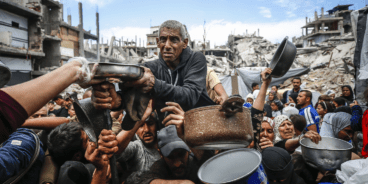
Atrocity Alert No. 52: Iraq and the Philippines
Atrocity Alert is a weekly publication by the Global Centre for the Responsibility to Protect highlighting and updating situations where populations are at risk of, or are enduring, mass atrocity crimes
Iraq
On 25 April a senior military commander in the Iraqi Security Forces (ISF) reported that the so-called Islamic State of Iraq and the Levant (ISIL) had been driven out of the al-Tanek neighborhood, the largest in western Mosul. The Iraqi government has been engaged in an offensive to militarily retake western Mosul from ISIL since 19 February.
Despite recent military gains, much of the western half of the city remains under ISIL control and up to 7,500 civilians continue to flee the city each day. According to the UN Office for the Coordination of Humanitarian Affairs, over 382,000 people have been displaced from western Mosul since 19 February. The situation for hundreds of thousands of civilians who remain trapped inside western Mosul continues to deteriorate, with ISIL committing war crimes, including targeting civilians as they try to flee and using them as human shields. Members of the ISF and Kurdish Peshmerga forces have also carried out reprisals against Sunni civilians and have been accused of extrajudicial killings of captured ISIL fighters. Airstrikes by the United States-led coalition in densely populated areas have also resulted in increased civilian casualties.
While confronting ISIL and other armed groups, it is essential that the Iraqi government ensures the protection of all civilians, and addresses the underlying sources of conflict in Iraq. The UN Security Council, with Iraqi government support, should immediately establish an international investigative commission to collect and protect evidence regarding mass atrocity crimes perpetrated by ISIL in Iraq, including the genocide against the Yazidi. All perpetrators of atrocities in Iraq should be held accountable for their actions, regardless of their position or affiliation.
Philippines
On 24 April Jude Sabio, a Filipino lawyer, filed a complaint with the International Criminal Court (ICC) accusing Philippines President Rodrigo Duterte and 11 other senior officials of crimes against humanity and mass murder.
Since President Duterte took office on 30 June 2016 almost 9,000 people have been killed during the government’s violent crackdown on alleged dealers and users of illegal drugs. While police have killed over 2,555 people in “anti-drug operations,” the rest have died in vigilante-style killings carried out by unidentified gunmen. President Duterte has publicly encouraged vigilante groups to join his violent campaign and has also threatened human rights lawyers and other critics.
If the Philippines government continues with its campaign of extrajudicial killings, and fails to hold perpetrators of possible crimes against humanity accountable, the international community should support calls for accountability under international law, potentially including via the ICC.
Related Publications


Atrocity Alert No. 437: Israel and the Occupied Palestinian Territory, Ukraine and Nigeria
